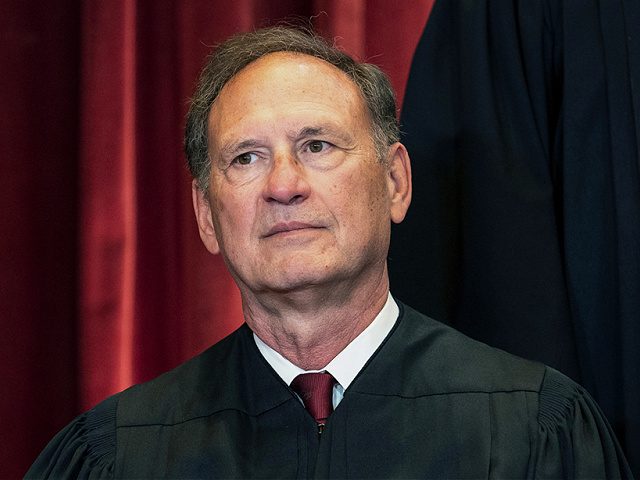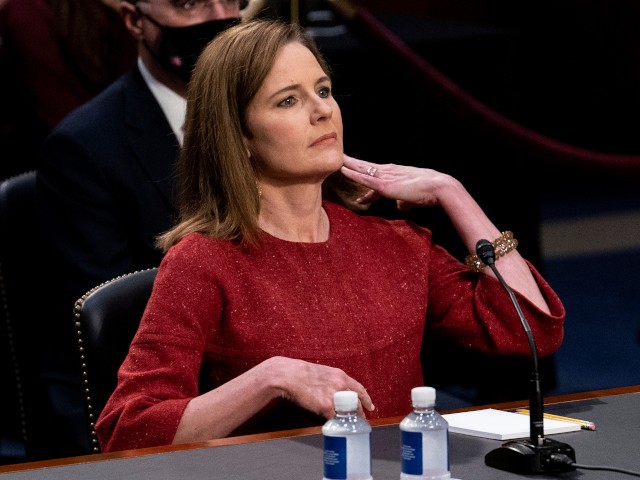Supreme Court Dismisses Social Media Censorship Case for Lack of Standing, Alito Issues Blistering Dissent
 Erin Schaff/New York Times via AP, Pool
Erin Schaff/New York Times via AP, Pool
WASHINGTON, DC – Social media companies like Facebook are free to continue censoring conservatives according to a divided Supreme Court, over a vigorous conservative dissent.
“During the 2020 election season and the COVID–19 pandemic, social-media platforms frequently removed, demoted, or fact checked posts containing allegedly false or misleading information,” Justice Amy Coney Barrett began for the majority. “At the same time, federal officials, concerned about the spread of “misinformation” on social media, communicated extensively with the platforms about their content-moderation efforts.”
Barrett recounted the facts of various officials in the White House, Centers for Disease Control and Prevention (CDC), the surgeon general, the Federal Bureau of Investigation (FBI), and the Cybersecurity and Infrastructure Security Agency (CISA).
“Though the platforms restricted the plaintiffs’ content, the plaintiffs maintain that the Federal Government was behind it,” Barrett explained. “Acting on that belief, the plaintiffs sued dozens of Executive Branch officials and agencies, alleging that they pressured the platforms to censor the plaintiffs’ speech in violation of the First Amendment.”
We begin—and end—with standing,” she declared. “At this stage, neither the individual nor the state plaintiffs have established standing to seek an injunction against any defendant. We therefore lack jurisdiction to reach the merits of the dispute.”

Supreme Court nominee Amy Coney Barrett listens during a confirmation hearing before the Senate Judiciary Committee, Tuesday, Oct. 13, 2020, on Capitol Hill in Washington. (Erin Schaff/The New York Times via AP, Pool)
The majority held that the plaintiffs failed to show they had suffered legal injuries that were traceable to Facebook and the company formerly called Twitter, that resulted from Biden administration coercion, and that a court could fix by issuing an order.
“The plaintiffs, without any concrete link between their injuries and the defendants’ conduct, ask us to conduct a review of the years-long communications between dozens of federal officials, across different agencies, with different social-media platforms, about different topics,” the majority concluded. “This Court’s standing doctrine prevents us from exercising such general legal oversight of the other branches of Government.”
Conservative Justice Samuel Alito wrote a blistering dissenting opinion, joined by fellow conservative Clarence Thomas and also Neil Gorsuch, who leans libertarian.
“Victims of the campaign perceived by the lower courts brought this action to ensure that the Government did not continue to coerce social media platforms to suppress speech,” Alito began. “All these victims simply wanted to speak out on a question of the utmost public importance.”
“If the lower courts’ assessment of the voluminous record is correct, this is one of the most important free speech cases to reach this Court in years,” Alito declared. “Freedom of speech serves many valuable purposes, but its most important role is protection of speech that is essential to democratic self-government and speech that advances humanity’s store of knowledge, thought, and expression in fields such as science, medicine, history, the social sciences, philosophy, and the arts.”
“Our country’s response to the COVID–19 pandemic was and remains a matter of enormous medical, social, political, geopolitical, and economic importance, and our dedication to a free marketplace of ideas demands that dissenting views on such matters be allowed,” he announced. “I assume that a fair portion of what social media users had to say about COVID–19 and the pandemic was of little lasting value.”
“Some was undoubtedly untrue or misleading, and some may have been downright dangerous,” Alito noted. “But we now know that valuable speech was also suppressed. That is what inevitably happens when entry to the marketplace of ideas is restricted.”
“Of course, purely private entities like newspapers are not subject to the First Amendment, and as a result, they may publish or decline to publish whatever they wish,” he acknowledged. “But government officials may not coerce private entities to suppress speech, and that is what happened in this case.”
“The Court, however, shirks that duty and thus permits the successful campaign of coercion in this case to stand as an attractive model for future officials who want to control what the people say, hear, and think,” the dissent continued against the court majority.
“What the officials did in this case was more subtle than the ham-handed censorship found to be unconstitutional in Vullo, but it was no less coercive,” Alito noted, referencing the NRA’s massive recent win against New York, adding:
And because of the perpetrators’ high positions, it was even more dangerous. It was blatantly unconstitutional, and the country may come to regret the Court’s failure to say so. Officials who read today’s decision together with Vullo will get the message. If a coercive campaign is carried out with enough sophistication, it may get by. That is not a message this Court should send.
“What these events show is that top federal officials continuously and persistently hectored Facebook to crack down on what the officials saw as unhelpful social media posts,” Alito went on, “including not only posts that they thought were false or misleading but also stories that they did not claim to be literally false but nevertheless wanted obscured.”
Pivoting to the First Amendment standards at stake, Alito cited precedent, holding that free speech does not allow banning speech “regardless of whether the Government carries out the censorship itself or uses a third party to accomplish what . . . is constitutionally forbidden.’”
“For months, high-ranking Government officials placed unrelenting pressure on Facebook to suppress Americans’ free speech,” Alito concluded. “Because the Court unjustifiably refuses to address this serious threat to the First Amendment, I respectfully dissent.”
Breitbart News senior legal contributor Ken Klukowski is a lawyer who served in the White House and Justice Department. Follow him on X (formerly Twitter) @kenklukowski.
Source link

